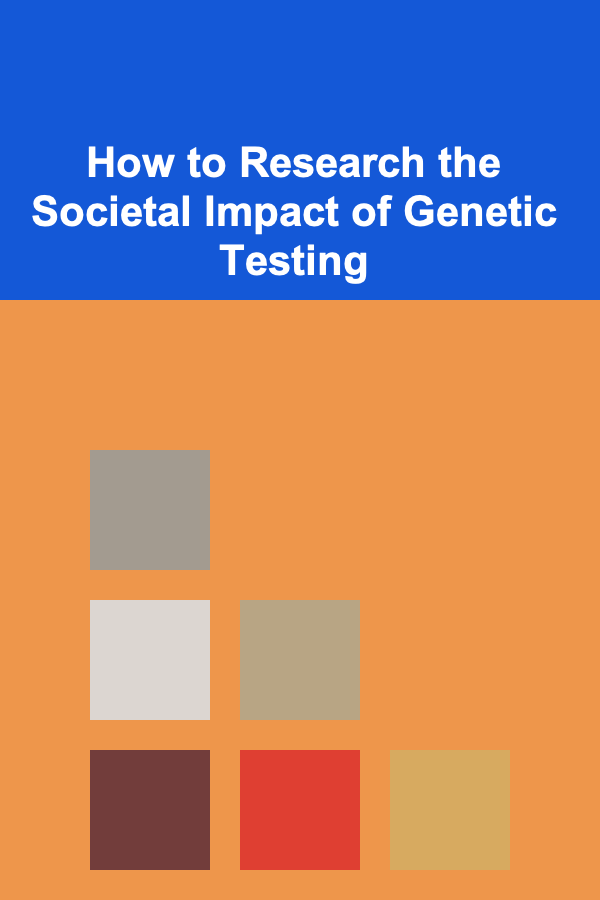
How to Research the Societal Impact of Genetic Testing
ebook include PDF & Audio bundle (Micro Guide)
$12.99$11.99
Limited Time Offer! Order within the next:

Genetic testing has rapidly evolved from a scientific curiosity to a tool that has practical applications in medicine, agriculture, forensics, and more. Its societal implications, however, are vast and multifaceted. These tests can provide insights into an individual's genetic makeup, helping predict the likelihood of inheriting or developing specific diseases. While this information can be life-saving, it also raises ethical, social, and psychological questions about privacy, access to healthcare, and the potential for misuse.
In order to research the societal impact of genetic testing, it is essential to explore various dimensions: scientific, ethical, legal, social, and economic. This article will delve into these aspects, outlining the methods, challenges, and key considerations when conducting research on this topic.
Introduction to Genetic Testing
Genetic testing involves analyzing an individual's DNA to identify specific genes or mutations that may lead to certain health conditions or traits. These tests are conducted through various methods, such as blood, saliva, or tissue samples. Genetic testing can be used to:
- Diagnose inherited diseases: Identifying whether someone carries genes associated with conditions like cystic fibrosis, sickle cell anemia, or Huntington's disease.
- Predict disease risk: Tests like BRCA1 and BRCA2 for breast cancer susceptibility or APOE for Alzheimer's disease can inform individuals about their potential for developing these conditions.
- Pharmacogenetics: Understanding how genetic variations affect an individual's response to drugs can guide personalized treatment plans.
- Ancestry and genealogy: These tests help individuals trace their family lineage and explore their genetic ancestry.
Despite the enormous benefits genetic testing offers, its societal implications are not straightforward. The impact of genetic testing touches on the broader public in several ways, influencing privacy, inequality, ethical standards, and access to care.
Scientific Foundations of Genetic Testing
Before delving into its societal impact, it is important to understand the scientific mechanisms behind genetic testing. At its core, genetic testing is grounded in the concept that an individual's DNA contains all the information necessary for their biological functions. By analyzing specific genetic markers, scientists can identify inherited conditions or susceptibilities to certain diseases.
The most common techniques for genetic testing include:
- Polymerase Chain Reaction (PCR): This technique amplifies small amounts of DNA to make them easier to analyze.
- Next-Generation Sequencing (NGS): A more advanced method that sequences entire genomes, enabling comprehensive testing for a range of genetic variations.
- Chromosomal Microarray Analysis: This method detects chromosomal imbalances and copy number variations that might be associated with certain diseases.
As genetic tests become more accurate and accessible, they open up numerous opportunities for medical advancements. However, understanding their broader societal implications requires examining the implications of their results.
Ethical Considerations of Genetic Testing
One of the most critical aspects of genetic testing research is its ethical implications. Genetic information is deeply personal and can have profound consequences for individuals and their families. Several key ethical questions arise when considering the use and misuse of genetic testing:
3.1. Informed Consent and Autonomy
Informed consent is the cornerstone of ethical medical practice, and genetic testing is no exception. Patients must fully understand what a genetic test entails, what the potential results might be, and the possible outcomes. However, given the complexity of genetic information, ensuring that individuals genuinely comprehend the implications of their tests can be challenging.
Genetic testing also raises concerns about autonomy. In some cases, individuals might be pressured into undergoing testing by family members, employers, or insurance companies. This is particularly concerning when it comes to the testing of children or individuals who may not fully comprehend the consequences.
3.2. Genetic Discrimination
One of the most concerning ethical issues related to genetic testing is the potential for discrimination based on genetic information. Genetic data could be used to deny individuals employment, insurance, or even access to healthcare. The fear of such discrimination has led many to advocate for stronger legal protections to prevent such outcomes.
For example, in the United States, the Genetic Information Nondiscrimination Act (GINA) was enacted in 2008 to protect individuals from genetic discrimination in health insurance and employment. However, GINA does not cover life insurance or disability insurance, leaving individuals vulnerable in those areas.
3.3. Privacy and Confidentiality
Genetic data is incredibly personal, and its potential misuse poses significant privacy concerns. Ensuring the confidentiality of genetic information is crucial, as its exposure could lead to stigmatization, discrimination, or psychological harm.
Research has shown that individuals may have concerns about the privacy of their genetic data, especially when they are stored by commercial testing companies like 23andMe or Ancestry.com. These companies hold vast amounts of personal data, and while they may protect it, the possibility of future data breaches or unauthorized use remains a significant concern.
3.4. Family Implications
Genetic testing can have far-reaching consequences beyond the individual tested. Results may uncover genetic risks not only for the person being tested but also for their family members. For example, discovering a genetic mutation linked to a hereditary disease may lead to difficult conversations about family members' health, testing, and possible future care.
The discovery of genetic conditions also raises issues regarding family planning. Couples may choose to undergo genetic testing for inherited conditions before having children, leading to ethical debates about reproductive rights and the potential for "designer babies."
Social Impact of Genetic Testing
Beyond the individual level, genetic testing has the potential to influence broader societal norms and systems. From public health to social equity, genetic testing can have profound effects on how we view health, disease, and disability.
4.1. Public Health Implications
Genetic testing could revolutionize public health by enabling the early detection of genetic conditions and the prevention of hereditary diseases. Predictive genetic testing allows individuals to take preventive measures before diseases manifest, reducing the burden on healthcare systems.
However, the widespread use of genetic testing also poses challenges. There is concern that genetic determinism could lead to an overemphasis on genetics as the sole factor influencing health. Public health strategies that focus solely on genetic predispositions may neglect other crucial factors such as environmental influences and lifestyle choices.
4.2. Health Inequality and Access to Genetic Testing
As with many advancements in medical technology, there is a risk that genetic testing could exacerbate existing health disparities. Access to genetic testing remains unequal across socioeconomic groups, with wealthier individuals and communities having better access to testing and follow-up care. In some cases, individuals in lower-income communities may not have the resources to pursue genetic testing or the necessary medical follow-up.
The cost of genetic testing remains high, despite recent advances in technology that have reduced its price. This creates a divide in the population, where some individuals may have access to genetic information that could improve their health outcomes, while others are left behind. This issue raises questions about equity in healthcare and whether genetic testing will become another tool that perpetuates inequality.
4.3. The Risk of Social Stigma
Another societal impact of genetic testing is the potential for social stigma. Individuals who test positive for genetic conditions or predispositions may face discrimination or social isolation. In some cultures, being identified as genetically predisposed to a disease may lead to negative perceptions or judgments about a person's worth or ability to contribute to society.
For example, individuals with genetic conditions like Huntington's disease, which has no cure and leads to progressive degeneration, may face significant psychological and social challenges after receiving a positive test result. The stigma associated with their genetic status could affect their ability to maintain relationships, work, or integrate fully into society.
Legal and Regulatory Aspects of Genetic Testing
Genetic testing is subject to a complex web of legal and regulatory frameworks. Different countries have different rules governing the use, storage, and dissemination of genetic information, and the legal landscape continues to evolve.
5.1. Genetic Testing Regulations
In many countries, genetic testing is regulated by government bodies to ensure that it is used safely and ethically. The regulation of genetic testing typically includes standards for:
- The accuracy and reliability of tests
- Informed consent
- Privacy protections
In the United States, the Food and Drug Administration (FDA) oversees the approval of genetic tests, while the Centers for Medicare & Medicaid Services (CMS) regulate laboratory testing procedures. Similar regulatory bodies exist in other countries, including the European Union and Canada.
5.2. Genetic Data and Intellectual Property
The rise of genetic testing has also led to questions about intellectual property and who owns genetic data. In some cases, companies that develop genetic tests may patent certain genetic markers, leading to concerns about monopolization. This raises broader questions about the commercialization of genetic data and whether individuals should have ownership or control over their own genetic information.
Conclusion
Researching the societal impact of genetic testing requires an interdisciplinary approach, encompassing ethics, law, social sciences, and medicine. Genetic testing has the potential to bring about significant positive changes in healthcare, enabling earlier diagnosis, better treatment plans, and the prevention of disease. However, the societal implications are profound and complex. From privacy concerns to issues of discrimination and inequality, the use of genetic testing necessitates careful consideration and regulation to ensure that its benefits are shared equitably and responsibly.
As genetic testing continues to evolve, society must grapple with the challenges and opportunities it presents. Researchers, policymakers, and the public must engage in thoughtful dialogue about how best to integrate genetic information into healthcare, ensuring that it serves the public good while safeguarding individual rights and freedoms.

Building Success: A Construction Manager's Blueprint for Effective Project Management
Read More
How to Calculate International Shipping Costs for Your Dropshipping Store
Read More
How to Invest in the Stock Market for Beginners
Read More
How to Sell Digital Products Successfully for Crafters & DIY Enthusiasts
Read More
Networking 101: Building Connections That Lead to Job Offers
Read More
How to Use VR for Therapy and Mental Health
Read MoreOther Products

Building Success: A Construction Manager's Blueprint for Effective Project Management
Read More
How to Calculate International Shipping Costs for Your Dropshipping Store
Read More
How to Invest in the Stock Market for Beginners
Read More
How to Sell Digital Products Successfully for Crafters & DIY Enthusiasts
Read More
Networking 101: Building Connections That Lead to Job Offers
Read More